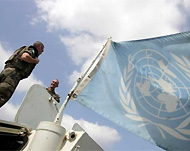Lebanese troops head south
Lebanese troops have headed to the south of their country to take control of Hezbollah bastions alongside UN peacekeepers as Israeli forces gradually withdraw after a 34-day war.

About 15,000 troops in trucks, armoured troop carriers and other vehicles were streaming through the town of Nabatiyeh on Thursday and were starting to cross the Litani river.
General Charles Shikhani, head of the army in the Marjayoun area, said that by the end of Friday the Lebanese army would control much of southern Lebanon for the first time in nearly 30 years.
“We should deploy within 24 hours along the Blue Line,” he said, referring to the UN-demarcated border between Lebanon and Israel.
Israel said on Thursday morning that it has handed over half the areas it occupied in the recent conflict to UN forces.
“We have transferred control of half the zones we were occupying in the south of Lebanon to Unifil [the UN Interim Force in Lebnon]. Unifil has then to hand over control to the Lebanese army,” a spokeswoman said.
The United States on Wednesday hailed the decision of the Lebanese cabinet to move its army south.
Gonzalo Gallegos, the state department spokesman, said: “It shows their commitment by a democratically elected government to holding the peace, to holding this cessation of violence, their willingness to act in accordance with the United Nations Security Council resolutions.”
Withdrawal
While the army will not allow the presence of any armed group, the cabinet decision did not mention any withdrawal of Hezbollah’s fighters or the rockets they fired at northern Israel during the conflict.
It did not say whether the troops would hunt for weapons. Many Hezbollah fighters are from border villages and Lebanese officials have privately said that there was no way to keep them away from their homes.
Mohammed Fneish, the Lebanese energy minister, said: “We have agreed to this decision without any reservations.”
In an address to the nation, Fouad Siniora, the Lebanese prime minister, said: “The mission of the army in the south is to defend the rights of the citizens, the state’s right and obligations to extend its authority over all the nation’s
|
Factbox: How Lebanon’s army lost control of its border 1976: The Lebanese civil war begins. Lebanon’s army fragments. In south Lebanon, major Saad Hadddad turns his army units into an independent, mainly Christian, militia The Free Lebanon Army to control areas around Marjayoun and Qlayaa. 1980: Renamed the South Lebanon Army (SLA), the militia fights armed Palestinian groups which run their own mini-state in the region. 1982: Israel invades Lebanon. It works closely with the SLA which it uses as a buffer force to stop first PLO, then Hezbollah attacks on Israel. 2000: Israel withdraws from south Lebanon. The SLA collapses. Many of its members flee to Israel. Hezbollah takes control over the formerly SLA-run border zone. 2006: The re-formed Lebanese army re-enters south Lebanon. |
territories … so that no weapons outside the state’s authority exist.”
Hezbollah has promised to co-operate with Lebanese and UN forces, but has said it was the wrong time to discuss disarmament.
Increased UN force
Tzipi Livni, the Israeli foreign minister, said on Wednesday the speed of Israel‘s withdrawal would depend on how long it took the Lebanese troops and an increased UN force to deploy.
“If there is a place that Israel can withdraw from and Unifil and Lebanese force can fill in, we will do it.
“But if it takes time until the international forces are organised, it takes time until Israel withdraws. This is the equation.”
More than 200,000 refugees have returned to the south without waiting for Israel to leave pockets of territory it has occupied.
Israel and Hezbollah have generally maintained a fragile truce in the south since Monday, although there have been isolated incidents of violence. On Wednesday, an Israeli soldier shot dead a Lebanese civilian in the border village of Tair Harfa.
Arms embargo
France said it was willing to lead a new UN force in Lebanon as long as it had a clear mandate and had sufficient strength. That pledge follows the adoption of a UN Security Council resolution authorising up to 13,000 well-armed troops to augment the 2,000-strong Unifil force now in Lebanon.
 |
|
France said it would lead the new |
Livni urged the UN force to enforce an arms embargo to prevent Hezbollah fighters from re-arming.
At least 1,110 people in Lebanon and 157 Israelis were killed in the conflict that started after Hezbollah captured two Israeli soldiers in a cross-border raid on July 12.
Amir Peretz, the Israeli defence minister, appointed a commission to investigate Israel‘s conduct of its war with Hezbollah, a ministry spokeswoman said.